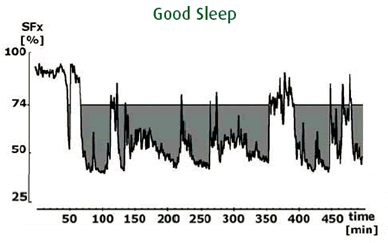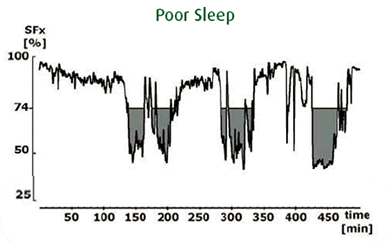An introduction to sleep
Sleep has been defined as the period when you are not awake. This sounds catchy, but may not always be helpful, especially to those who find they can’t sleep very well!
Scientifically speaking, sleep is the regular period in every 24 hours when we are normally unconscious and unaware of our surroundings. Sleep is governed by our body’s internal clock, known as the circadian rhythm, and it is this rhythm which becomes disrupted when working night shifts or suffering jet lag.
Why do we need to sleep?
The renowned Swiss herbalist, Alfred Vogel, once described sleep as ‘the remedy which we cannot do without.’
A very important function of sleep is to restore our body to full function after the ‘wear and tear’ of the day’s activities. This is especially important for our brain. At night, with good sleep, tissues are repaired, organs rest or finish cycles such as flushing out toxins and the brain filters and processes the events of the day.
This is perhaps similar to a crew of maintenance staff moving in to sweep, dust, mop and repair your house, mending cracks that have shown up during the day, emptying the rubbish bins, filing the mail delivered and restoring your home to full working order for the next day.
What is good sleep?
Two phases of sleep have been identified by experts and scientists. With normal or good sleep, we move from one phase to the other and back again in cycles lasting between 90 and 120 minutes. These phases are known as:
- a. Rapid Eye Movement (REM) sleep. During this phase, the brain is very active and our eyes move quickly from side to side (hence the name). Dreams occur during REM sleep and when sleeping well, we wake in the morning coming out of REM sleep which is why we remember our last dream of the night
- b. Non-REM sleep. During this phase of sleep, our brain is quieter, but our bodies move around the bed more. This is when we experience ‘deep sleep’. Interestingly, sleep-walking takes place during non-REM sleep.
With good sleep we will have short periods lasting for a minute or so during which we are awake. These episodes are normal and take place several times a night – they are part of the way our sleep moves through the REM and non-REM phases.

How much sleep do we need?
It is said that the average person needs seven-and-a-half hours sleep a night. However, averages conceal large differences and in truth, the amount of sleep each person requires varies considerably.
Age and personality play a fundamental part. Whilst most of us feel we need 7 to 8 hours sleep a night, there are some well-known examples of people who can get by with only 4 hours.
Generally, we need less sleep the older we get. Newborn babies seem to sleep for most of the day and a young child may require about 10 hours. Thereafter, some form of regression appears to take place, as teenagers seem to spend a great deal of time sleeping and experience great difficulty getting out of bed in the morning. However, this changes and as we pass into the 5th decade of our lives, we seem to require less and less sleep.
In addition to all this, our normal sleeping pattern changes through our adult years. For instance, an older person will sleep very deeply for the first 3 to 4 hours but wake more easily during the second half of the night.
Bad sleep
Research tells us that over 25% of people in the UK feel that they sleep badly and look for more sleep or better quality sleep.
When you sleep badly, the normal cycles of REM and non-REM sleep are disrupted – sleep is shallower, lighter and not as restful.

The causes of bad sleep can be divided into two main categories – sleep problems and sleep disorders.
Sleep problems
These represent the main reasons why people sleep badly. Sleep problems are not medical conditions but arise out of ‘normal everyday problems’ or minor health conditions that disturb your sleep.
Sleep problems fall into three main categories:
- Inability to fall asleep
- Poor quality sleep (you wake through the night
- Waking up early
The causes of sleep problems are varied but range from having a new baby, stress, anxiety and excitement, to minor health problems such as menopausal night sweats, having to get up to urinate because an enlarged prostate or a painful muscle or joint.
Follow the links for more information on sleep problems and their causes.
Sleep disorders
Sleep disorders, on the other hand, are medical problems which directly affect your sleep. They are less common then sleep problems and can include:
- Insomnia – severe difficulty in getting to sleep and staying asleep
- Sleep apnoea – this is when your breathing is interrupted while you are asleep
- Narcolepsy – this is when your sleep cycles are not regulated properly
- Delayed Sleep Phase Syndrome – this is when your normal sleep cycles are delayed by several hours
- Sleep walking – this is when you perform activities while you are asleep that are normally associated with consciousness
Follow the link to find out more about sleep disorders.
Sleep deprivation
Sleep problems (if severe enough, but this is rare) and sleep disorders can both lead to sleep deprivation – a situation where physical effects caused by a lack of sleep are experienced.
To put this into context, the most common cause of sleep deprivation is when a new-born child arrives. Unfortunately, some babies just sleep better than others.
For more information, follow to link to sleep deprivation.
Sleep facts
- We spend one third of our life sleeping
- In an average lifetime, we will spend around 6 years of it dreaming – more than 2,000 days
- 25% of people in the UK feel that they can’t sleep well or are said to suffer from disturbed sleep
- Napoleon, Florence Nightingale and Margaret Thatcher are all said to have needed only four hours sleep a night
- The current world record for the longest period without sleep is 11 days set by Randy Gardner in 1965
- Everybody dreams. EVERYBODY! Simply because you do not remember a dream does not mean that you do not dream
- We dream an average of one to two hours every night – and often have 4 to 7 dreams per night
- Five minutes after the end of a dream, half the content is forgotten. After ten minutes, 90% is lost
- Studies have shown that our brain waves are more active when we are dreaming than when we are awake
- Toddlers do not dream about themselves. They do not appear in their own dreams until the age of 3 or 4 years
- The amount of sleep an animal needs varies extremely widely – from 18 hours in a python to 3.3 hours for the African elephant and 1.9 hours for the giraffe. Cats are said to sleep for 12.1 hours on average, but this figure is hotly disputed by a number of cat lovers.








